Netanyahu rejects Hamas-proposed deal for hostage return
Israeli Prime Minister Benjamin "Bibi" Netanyahu reaffirmed his hardline position against a Palestinian state on Saturday, shortly after a telephone discussion with Joe Biden in which the US president suggested a two-state solution for Israel and the Palestinian territories.
Bibi’s office threw cold water on the idea, clarifying that “[A]fter Hamas is destroyed Israel must retain security control over Gaza to ensure that Gaza will no longer pose a threat to Israel, a requirement that contradicts the demand for Palestinian sovereignty."
While Bibi claims his strategy will safeguard Israel's security, others see it as an attempt to appease right-wing elements in his coalition government. That’s not sitting well with allies abroad, including US Democrats. One of them, Maryland Sen. Chris Van Hollen, is advancing an amendment to the use of US national security aid, obliging countries receiving American military aid to use the weapons in accordance with US law, international humanitarian law, and the laws of armed conflict. As of Friday, the bill had 18 Democratic cosponsors.
And there’s division in Israel
On Sunday, Bibi rejected a deal proposed by Hamas that would have seen Israeli hostages released in exchange for Israeli troops withdrawing from Gaza, the release of Palestinian prisoners, and recognition of Hamas' government of Gaza. He said the terms would leave Hamas intact and encourage them to attack again.
But not everyone agrees with his tough stance. The Hostages and Missing Families Forum began a protest outside Netanyahu's residence, vowing to stay put until he accepts a deal. Even before the prime minister rejected Hamas' offer, thousands of protesters took to the streets in Tel Aviv on Saturday demanding new elections.
Bibi's stance is also dividing the Israeli cabinet and the country’s military. Gadi Eisenkot, a former army chief now serving in the war cabinet, stated, "It’s an 'illusion' to believe that the hostages could be rescued alive through military operations." According to four senior military officers interviewed by the New York Times, the twin objectives of freeing the hostages and destroying Hamas are now mutually incompatible.
We’ll be watching to see whether increased pressure makes him change gears — or leads to a change of leadership.
Haley’s last stand
Is a Donald Trump triumph inevitable? After the former president’s crushing victory in the Iowa caucuses, where he obtained a never-before-seen 51% of the vote, all eyes turn to Tuesday’s contest in New Hampshire.
Florida Gov. Ron DeSantis suspended his campaign on Sunday and endorsed the former president. The man who emulated Trump right down to his hand gestures while on the political rise was at one point considered the leading candidate to take him on, coming within 15 percentage points of Trump in polls from March 2023. But he wound up 30 points behind in Iowa — and his choice to endorse Trump shows just how firmly the former president controls the Republican Party.
So now, it’s a do-or-die moment for former South Carolina Gov. Nikki Haley, the last contender with even the slightest chance of rivaling the former president. The former UN ambassador placed third against Trump in Iowa and must perform well on Tuesday – she probably needs to win outright – if her campaign is to continue.
The Granite State offers Haley her best chance. A significant number of New Hampshire Republicans are staunchly anti-Trump. The state is also famous for its political independence and open primary system. Haley’s strategy hinges on wooing moderate Republicans and mobilizing independent voters disillusioned with Trump's polarizing politics.
Despite this, Haley has a fight on her hands. Trump took the state with 35% of the vote in 2016, and the most recent poll shows him leading Haley by eleven points. At a recent rally in Concord, NH, Trump trotted out an endorsement from South Carolina Sen. Tim Scott. And Trump has shamelessly played the race card: In a post on his Truth Social account, Trump repeatedly referred to Haley, the daughter of Indian immigrants, as “Nimbra.” (She was born Nimarata Nikki Randhawa but has always used her middle name.)
The anti-Trump forces know what’s at stake. In the words of Gordon J. Humphrey, a former New Hampshire senator now campaigning against Trump. “If he wins here, Trump will be unstoppable.”
And the world is watching
A Trump triumph wouldn’t just upset the apple cart in America. It would mean challenges for many world leaders – including Ukrainian President Volodymyr Zelensky.
A bipartisan deal in the Senate that would get more aid to Ukraine in exchange for tougher immigration measures desired by the GOP looks like it may stall after Trump expressed his opposition to it on social media. It’s the kind of curveball that should make foreign leaders wonder which of their key interests with the United States might be held hostage to domestic political priorities should Trump win again in November.
Sudan descends into disaster
A United Nations report delivered to the UN Security Council Friday has found that between 10,000 and 15,000 people were killed last year in the city of El Geneina in the West Darfur region of Sudan. This exceeds the UN’s original estimate of 12,000 deaths following six months of ethnic violence committed by the country’s Paramilitary Rapid Support Forces and allied Arab militia against its Masalit minority.
In the report, UN monitors describe as “credible” accusations that the United Arab Emirates furnished military support to the RSF via northern Chad.
In response, a UAE spokesperson denied that the country was “supplying arms and ammunition to any of the warring parties” and claimed it does not favor either side.
A humanitarian crisis
One thing no one can deny is that Sudan is in crisis on multiple levels. Doctors Without Borders says half of Khartoum’s 6 million people have no access to healthcare. The city itself has descended into a lawless anarchy replete with sexual violence. And the displacement of farmers has left five million people at risk of starvation.
With the world’s focus divided between wars in Ukraine and Gaza, as well as geopolitical tensions between the US, China, Russia, and Iran, this fresh catastrophe in Sudan once again risks being ignored until it is too late.
Chinese bears, Indian bulls
It’s been a bad month for C
hinese stock markets. Since Jan. 1, the Hang Seng China Enterprises index has plunged 12%, after losing 14% last year. The benchmark CSI 300 index for domestically traded stocks has shed more than 5%, after accounting for the renminbi’s drop against the dollar. A slide that started in 2021 has now erased $6.3 trillion from Chinese and Hong Kong equities, a sell-off that is reshaping geopolitical dynamics in Asia, particularly for India.
Compared to China, India has emerged as a darling of global investors, with indices like the Nifty 50 and BSE Sensex reaching record highs. JPMorgan hails India as its number one market in Asia, crediting companies adopting a “China plus one” strategy. Foreign investment is up, with firms like Apple, Maruti Suzuki, and a host of drug companies increasing production on the subcontinent.
What’s driving the switch?
China’s “economic malaise” has been making headlines for some time. Its real estate sector is in deep crisis, while unemployment and disillusionment among young people are rampant. While Beijing claims the country enjoyed economic growth of 5.2% last year, not all economists believe the numbers. All of which makes investors nervous and looking for other options.
What could this mean for the rest of the world?
While some observers think a slowing economy could temper China's aggressive foreign policy and trade practices, others think it could up the military ante for President Xi Jinping. Economic woes could undermine Xi’s leadership, creating the need for a distraction or rallying point to keep his hold on power. That could spell trouble for some of China’s neighbors such as Taiwan and the Philippines.It could also make it more difficult for China to continue using its Belt and Road Initiative to curry favor with governments in the region. Since 2018, China has committed or invested over $150 billion in the economies of Bangladesh, Maldives, Myanmar, Pakistan, Nepal, Sri Lanka, and Afghanistan, and is now the biggest foreign investor in Maldives, Pakistan, and Sri Lanka. If China’s money runs low, so could its influence – opening the door for rival powers, like India, to fill the vacuum.
In 2020, Mastercard founded the Priceless Planet Coalition with Conservation International and World Resources Institute, uniting the efforts of businesses and consumers to fight climate change and restore 100 million trees.
During COP28 in Dubai, Mastercard brought a group of climate leaders from business and academia to a nearby restoration site to experience the critical mangrove ecosystem firsthand and to contribute to its future by planting mangrove saplings.
On Monday, thousands of worshippers flocked to the Indian city of Ayodhya to attend the inauguration of what some are calling the “Hindu Vatican.” The newly opened temple epitomizes the ruling Hindu-nationalist Bharatiya Janata Party and Prime Minister Narendra Modi’s ascendance and is a symbol of their political dominance in India.
The regional airport is full of private jets, and local shops have run out of gold-plated idols as the faithful splurged for what amounts to a once-in-a-lifetime pilgrimage. The massive pink sandstone and white marble complex, intricately engraved and decked out with tens of thousands of flowers, cost approximately $181 million to build in a country where laborers earn around $5 a day.
And at the center of it all is Modi, who wrote on X (formerly Twitter) that “Lord [Ram] has made me an instrument to represent all the people of India during the consecration.” Not a bad platform to whip up his base ahead of spring elections – and given that construction hasn’t actually finished, that may be exactly why he staged the opening now.
But how did this modest northeastern city become the center of Modi’s project to remake the once famously secular India into a Hindu state? Take a deep dive into the history here.
From race to gender to profession to nationality, we define who we are in a million different ways. Many people feel strongly about those identities; they are a fundamental part of how we see the world, find community, and relate to each other. But despite good intentions on the progressive left, at what point does focusing on what makes us different from each other hurt our society more than it helps? When does a healthy appreciation for culture and heritage stifle discourse and deny mutual understanding?
On GZERO World with Ian Bremmer, political scientist and author Yascha Mounk weighs in on identity, politics, and how those two combine to create the complicated, contentious idea of “identity politics.” Mounk’s latest book, “The Identity Trap,” explores the origins and consequences of so-called “wokeness” and argues that a counterproductive obsession with group identity has gained outsize influence over mainstream institutions.
"I think the important thing is not to build a culture in which we are forced to double down on narrow identities," Mounk tells Bremmer, "in which we cease to build the broader identities, like ones as Americans, but allow us to sustain solidarity with people who are very different from us."
Watch the full clip here and catch GZERO World with Ian Bremmer online every week or on US public television. Check local listings.
Refer your friends to our newsletter. We’ll give you a shoutout. All you have to do is click here. They’ll thank you. And we will too.
| Click to email a link to your friends |
27: At least 27 people were killed and 25 injured in a Ukrainian strike on the Russian-held city of Donetsk on Sunday. The attack came the same weekend as a drone attack on the Russian Ust-Luga gas terminal near St. Petersburg, resulting in a large fire but no injuries. Described as a “special operation” by Kyiv's SBU security service, the strike was aimed at disrupting fuel exports and supplies for Russian troops.
300,000: Germany is debating whether to ban the far-right Alternative for Germany party after its senior members attended a meeting where mass deportations of immigrants were allegedly discussed. While AfD's leadership denied the accusations and claimed they were being targeted with “Stasi-like” tactics, 300,000 protesters took to the streets Saturday to protest the party and its growing influence in German politics.
70: After a disputed election last December, Felix Tshisekedi was sworn in for his second term as president of the Democratic Republic of Congo. Tshisekedi obtained over 70% of the vote, but opposition politicians claimed that many polling stations failed to open or lacked materials, and voter turnout was only 40%. Tshisekedi’s first inauguration in 2019 marked Congo's first democratic transfer of power since achieving independence from Belgium in 1960.
3: North Korea claimed to have tested a “nuclear-capable” underwater drone for the third time in response to US and South Korean naval drills on Friday. South Korean intelligence cast doubt on the claimed capacities of the drone, but with North Korea’s bellicose rhetoric in recent weeks, perhaps discretion is the better part of valor.********
Somvaar comes from Hindi, the most widely spoken language in India, indigenous to the area around Ayodhya. (We took it easy on ya today). GZERO पढ़ने के लिए धन्यवाद!
This edition of GZERO Daily was written by Tasha Kheiriddin and Matthew Kendrick. Edited by Matthew Kendrick and Tracy Moran.





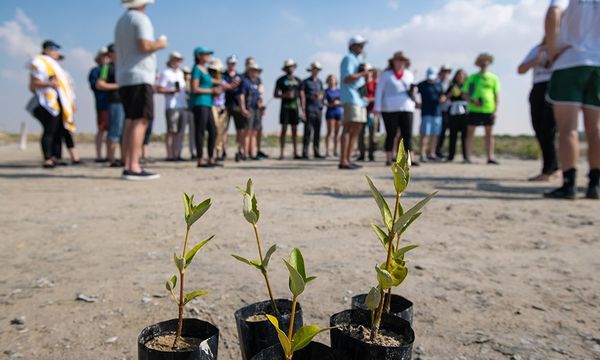
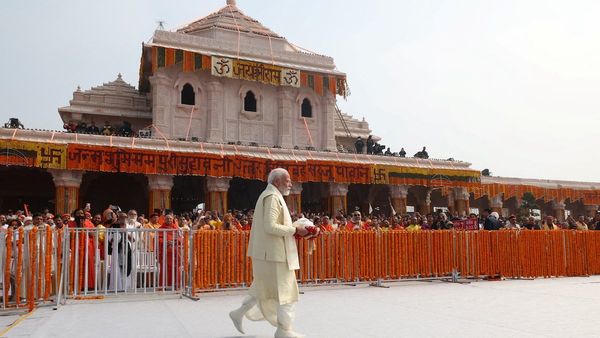
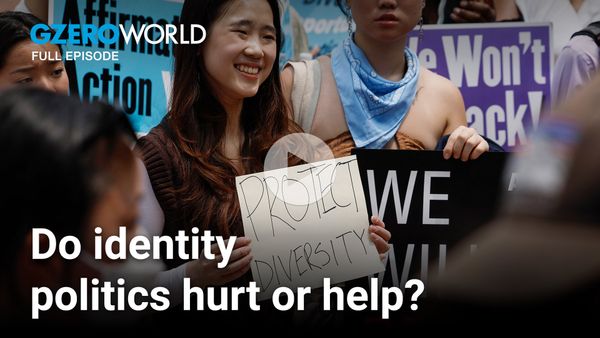
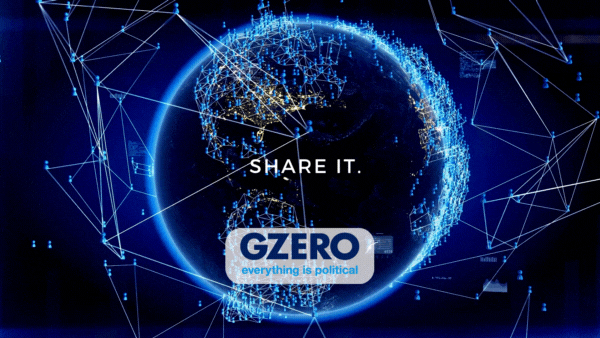
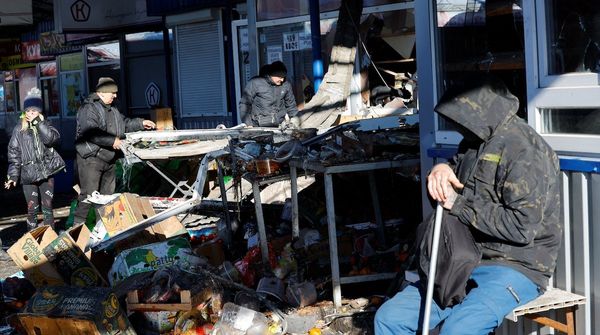
No comments:
Post a Comment